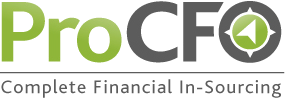
Financial Statements Services
Stockholders, creditors, and private investors often need assurance that the financial statements accurately represent the true financial position of a company.
Your stockholders, creditors, or private investors have different levels of risk tolerance, so it is important to know which level of assurance meets your needs.
ProCFO only does compilations and reviews although you can review the following descriptions for the differences in the financial statement reports.
Audit: The Highest Level of Assurance
An audit is a methodical review and objective examination of financial statements, including the verification of specific information as determined by the auditor or as established by general practice.
An Audit allows you to:
Satisfy stakeholders such as employees, customers, suppliers and pressure groups, as well as the investing community, as to the credibility of published information.
Facilitate the payment of corporate tax, goods and services tax, and other taxes on-time and accurately, thereby avoiding interest, penalties, and investigations.
Comply with banking covenants.
Help deter and detect material fraud and error.
Facilitate the purchase and sale of businesses.
Here are the Benefits
You get the highest level of assurance because testing goes outside your company to obtain more information. Typically, the auditors will get written communication with:
Your customers, to check outstanding receivable balances,
Your banks, to confirm cash or debt balances and terms,
Your vendors, to verify outstanding payable balances, and
Your attorneys, for information on pending or threatened legal action.
Also physical inspections will usually be performed by observing your inventory counting methods and perform test counts. The auditors will document and test each operating cycle, including sales and cash receipts, expenses and cash disbursements, and payroll. The audit papers include a detailed work program to document the examinations and testing performed, as well as the client's supporting work papers.
Audits Not Just for Public Entities
All public companies are required to have an annual audit, but some nonpublic entities must undergo an annual audit as well. These include local governments, not-for-profit agencies and other organizations receiving government grants.
Moreover, some financial institutions require audits of nonpublic companies based on the financing amount and/or the bank's assessment of the company's risk. Also, companies with absentee ownership (such as those owned by investment firms, or individuals who no longer run the business) may order audits as checks of their management teams.
Review: Limited Assurance
Less extensive than an audit, but more involved than a compilation, a review engagement consists primarily of analytical procedures that are applied to the financial statements, and various inquiries made of your company's management team. If the financial statements or supporting information appear inconsistent or otherwise questionable, additional procedures may be performed.
A review doesn't require a study and evaluation of your company's internal controls or verify data with third parties or physically inspect assets. Rather, a review report expresses limited assurance in the form of the statement: "We are not aware of any material modifications" for the financial statements to be in conformity with the Generally Accepted Accounting Principles (GAAP). Reviewed financial statements must include all required footnotes and other disclosures.
Why might a business request a review engagement? It can be a good middle ground, providing the advantages of a CPA's technical expertise without the work and expense of an audit.
Compilation: Lowest Level of Assurance
In compiling financial statements for a client, we present information that is the "representation of management" and expresses no opinion or assurance on the statements. Compilations don't require inquiries of management or analytical procedures. Instead, we rely on our knowledge of accounting principles and a general understanding of your business.
Banks often require compilations from an independent CPA as part of their lending covenants.
Which Report Should You Use?
Each type of financial statement report may suit specific circumstances, depending on requirements from your client's bank or other parties, as well as meet budgetary needs. Understanding each report's unique strengths and weaknesses can help you choose the most appropriate one. Please call if you have questions about which type of report is right for you.
Understanding each report's unique strengths and weaknesses can help you choose the most appropriate one. Please call if you have questions about which type of report is right for you or complete the form below for a consultation.
Reduce Taxes
Chances are you are paying too much tax. We take a deep dive into your business and develop a tax strategy to keep 10-40% more money in your pocket!
Business Accounting
In addition to saving money, we help you save time. Let us remove the load of keeping accurate financial records with our bookkeeping and payroll services.
Passive Income
We help you develop a clear financial plan to develop passive income from your business so you can build a lasting financial legacy and enjoy retirement years earlier.
At times you may need a trained outside professional to evaluate your company's operations and determine if the appropriate controls are in place to ensure proper handling of resources, and to protect yourself from employee theft.
We assess your internal control systems to determine the efficiency and effectiveness of your operating procedures. Then we make recommendations that help your company become stronger and more profitable by correcting any inefficient or ineffective operating procedures we find.
What we do for you:
Implement segregation of duties so that duties are divided, or segregated, among different people to reduce risk of error or inappropriate actions. No one person has control over all aspects of any financial transaction.
Make sure transactions are authorized by a person delegated approval authority when the transactions are consistent with policy and funds are available.
Ensure records are routinely reviewed and reconciled by someone other than the preparer or transactor, to determine that transactions have been properly processed.
Make certain that equipment, inventories, cash and other property are secured physically, counted periodically, and compared with item descriptions shown on control records.
Provide employees with appropriate training and guidance to ensure they have the knowledge necessary to carry out their job duties, are provided with an appropriate level of direction and supervision, and are aware of the proper channels for reporting suspected improprieties.
Document policies and procedures and make them accessible to employees. The documented policies and procedures provide day-to-day guidance to your staff and continuation of duties in the event of prolonged employee absences or turnover.
Review operations to ascertain whether results are consistent with established objectives and goals and whether the operations are being carried out as planned.
If you'd like more information about our internal control services please complete this form to setup a consultation.



